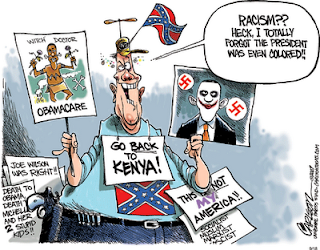“If it looks like a duck; walks like a duck; and quacks, it’s a duck:” The Party of Lincoln’s Race Problem

Its official, Herman Cain has "enthusiastically" endorsed Newt Gingrich for president of the United States. "There are many reasons, but one of the biggest reasons is that I know that Speaker Gingrich is a patriot. Speaker Gingrich is not afraid of bold ideas, and I also know that Speaker Gingrich is running for president and going through this sausage grinder," said Cain. "I know what this sausage grinder is all about. I know that he is going through this sausage grinder because he cares about the future of the United States of America." Cain, the former head of Godfather Pizza and a former frontrunner for the Republican presidential nomination who suspended his campaign in December under a cloud of allegations of sexual and marital deviance is black, and to some, this is the kind of prima facie evidence that supports Newt's claim that he is not a racist. I concede that there are times when my eyes and ears seem to lie to me about certain things, bu...
